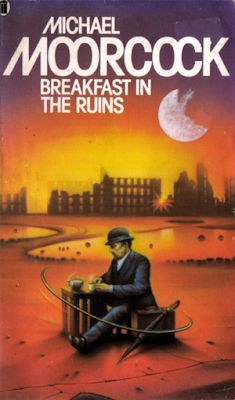'Breakfast in the Ruins' - Michael Moorcock (New English Library)
Today is 'Half Year Review' Day, at work, and comes complete with all the stress that you'd expect so you probably won't be surprised to hear that I didn't read at all last night; I went to the pub instead to watch a little football and try and forget about today (a good result for my team brightened the mood a little).
While I'm going through my review business then, I thought I'd recycle another 'post from the past', just to keep things ticking over until I can get home and write tomorrow's post ;o) It's been a while since I featured anything by Michael Moorcock (November 2nd, to be precise) so figured it was time to do something about that :o) The full review is over Here but really, it's just the addition of an opening paragraph that no-one will miss in this post...
A chance meeting leads Karl Glogauer into the maelstrom of time and space; cast in various roles but always a witness to man's inhumanity. What will be left of him on his return? And who is the mysterious stranger that guides him...?
'Breakfast in the Ruins' is an unsettling read, only a hundred and seventy four pages long but packing content that could fill a book twice the size (and stays in your head for a long time afterwards, some of the imagery is disturbing to say the least). It's pitched on three levels and this approach failed to be as effective as I think it was meant to be. It's like there are three 'mini-books' vying for attention and the strongest one overshadows the other two.
The 'winner' in this respect is the part of the book that shows Glogauer's journeys into various alternate earths. Moorcock really lays bare man's ability to oppress his fellow, casting Glogauer in a number of roles to maximmise that impact. If Glogauer isn't the victim (or witness) then he is the perpetrator of acts that are all the more brutal for the fact that not all of these histories are alternate (I'm talking Auschwitz, Kenya and Vietnam here). We're not just capable of doing this stuff, it actually happens. The alternate stuff is no less forceful, especially Glogauer's potential end.
All this force and energy drowns out the rest of the book though. I got to the end and realised that something really important had happened, in the relationship between Glogauer and the mysterious stranger, but I'd missed it because of how strong the alternate history bits were. It's clear what the outcome is but I'm going to have to go back and re-read the book just to see how we got there. I missed that pivotal moment but it's still interesting to see the balance of power shift backwards and forwards over the course of the book.
The 'third bit' is almost deliberately understated. Here, Moorcock invites us to measure our potential inhumanity against a series of moral dilemmas. It's understated and that seems to really invite you to think about what's being asked here (and there is plenty to ponder although some questions are a bit too obvious); that understatement is also an unhappy side affect of the main strand though...
Finishing 'Breakfast in the Ruins', I couldn't help but wonder what might have been had the book been a little more balanced and equal attention paid to the three threads. Like I said though, it's a powerful and unsettling read that has taken up residence in my head for the next week or two... Worth a look if you can find a copy.




Comments
Post a Comment